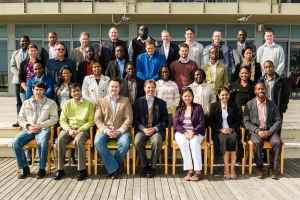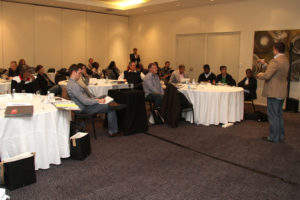Programme in Microinsurance Business Strategies for African Markets (2012)
Programme in Microinsurance Business Strategies for African Markets (2012)
3 September, 2012 • Cenfri in collaboration with the International Labour Organization’s (ILO) Microinsurance Innovation Facility and the University of Stellenbosch Business School Executive Development (USB-ED)presented a training programme in Microinsurance Business Strategies for African Markets from the 24th to 27th of July 2012 at the Lagoon Beach Hotel in Cape Town, South Africa. The training was attended by 31 practitioners (including financial institutions, insurers and retailers), regulators and technical assistance providers from Botswana, Ghana, Kenya, Mauritius, South Africa, Swaziland and Zambia.
Cenfri in collaboration with the International Labour Organization’s (ILO) Microinsurance Innovation Facility and the University of Stellenbosch Business School Executive Development (USB-ED)presented a training programme in Microinsurance Business Strategies for African Markets from the 24th to 27th of July 2012 at the Lagoon Beach Hotel in Cape Town, South Africa. The training was attended by 31 practitioners (including financial institutions, insurers and retailers), regulators and technical assistance providers from Botswana, Ghana, Kenya, Mauritius, South Africa, Swaziland and Zambia.
The programme benefited from some large company and country contingencies which brought together different parties from the same organization or country – such as actuaries and product developers or practitioners and regulators – and provided them with the tools and resources to form the foundation for a business strategy to roll out or improve their microinsurance activities (either from a practitioner or regulators perspective). Participants have continued to engage with each other, as well as with Cenfri, to take the learning’s from the programme forward.
The programme is held on an annual basis in Cape Town, South Africa.
This year’s three-and-a-half-day programme included the following sessions:
- Key trends in microinsurance development
- Exploring futures and opportunities for African Financial Sector Development
- Introduction to Innovation in Business Models
- Innovation in Microinsurance Business Models: Mobile and Agent Case Study session
- Assessing Market Opportunities and Understanding Client Behaviour
- Trends and Standards in Microinsurance Regulation: What Businesses Need to Know
- Proving and Improving Business Value Propositions
- Innovation in Microinsurance Business Models: Retailer Case Study session
Participants expressed their satisfaction with the programme:
“We definitely enjoyed the programme and found it very insightful and fascinating.”
“The course was indeed very valuable…I truly appreciate the learning experience”
Key learnings from the programme included:
- Main trends impacting financial sector development and emerging in microinsurance;
- Basic principles of microinsurance innovation for product design and distribution;
- Latest evidence on low-income financial behaviour to inform product and channel design;
- Major regulatory considerations for doing business in microinsurance; and
- Various elements of the client value proposition
Highlights from the programme included:
Craig Churchill – Team Leader of the ILO’s Microinsurance Innovation Facility – introduced the five emerging trends in Microinsurance from Protecting the Poor: A Microinsurance Compendium – Volume II:
- The definition of microinsurance is becoming operational
- Many more low-income households are covered by insurance
- Stakeholders in microinsurance are becoming more diverse
- Providers are offering an expanding and varied range of products
- There is greater concern that insurance provides real value to the insured
Jeremy Leach – Bankable Frontier Associates – drew from his own experience delivering insurance to low-income populations via the mobile phone in the Innovation in Microinsurance Business Models: Mobile and Agent Case Study session to offer insights on the market evolution of mobile insurance schemes: embedded loyalty → airtime deduction → mobile wallets.
Pedro Bulcão – Founder of Sinaf Seguros – joined the discussions from Brazil via Skype in the Trends and Standards in Microinsurance Regulation: What Businesses Need to Know session and offered insights from his experience delivering insurance to low-income populations in Brazil. The discussion focused on the implications of the new regulation drafted by SUSEP (insurance regulator) in Brazil as well as Sinaf Seguro’s layered sales approach.
Emersion Visit – participants were taken on an emersion trip to Cape Town’s largest township (and the third largest in South Africa) – Khayelitsha – to see how microinsurance operates in practice. Inside the township, participants (i) visited the Khayelitsha mall to get a better understanding of how retailers distribute microinsurance and (ii) visited households to learn more about their needs and risk coping strategies.
 PACE Analysis – participants built upon their experience in Khayelitsha by comparing and analysing the client value propositions of the different risk coping mechanism
PACE Analysis – participants built upon their experience in Khayelitsha by comparing and analysing the client value propositions of the different risk coping mechanism
s (informal and formal) from the immersion visit in the Proving and Improving Business Value Propositions session. The session was facilitated by ILO Microinsurance Innovation Facility’s Craig Churchill and Jasmin Suminstrado and introduced the PACE Client Value Analytical framework.
